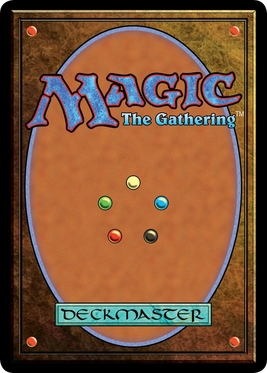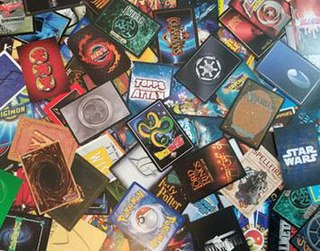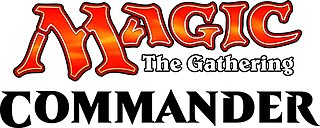
Magic: The Gathering is a tabletop and digital collectible card game created by Richard Garfield. Released in 1993 by Wizards of the Coast, Magic was the first trading card game and had approximately fifty million players as of February 2023. Over twenty billion Magic cards were produced in the period from 2008 to 2016, during which time it grew in popularity. As of the 2022 fiscal year, Magic generates over $1 billion in revenue annually.

Wizards of the Coast LLC or Wizards) is an American publisher of games, most of which are based on fantasy and science-fiction themes, and formerly an operator of retail game stores. In 1999, toy manufacturer Hasbro acquired the company and currently operates it as a subsidiary. During a February 2021 reorganization of Hasbro, WotC became the lead part of a new division called "Wizards & Digital".

The Pokémon Trading Card Game, abbreviated as PTCG or Pokémon TCG, is a collectible card game developed by Creatures Inc. based on the Pokémon franchise. Standard gameplay cards include Pokémon cards, energy cards, trainer cards, and stadium cards, a variant of trainer cards. Pokémon cards contain data about the creature's type,and where it came from, attacks, ability, and HP as well as any special effects the cards have on the game. Basic (unevolved) Pokémon can change into their evolved forms during the game by playing subsequent evolution cards in the deck. Energy cards can be attached to Pokémon cards to power up attacks, and trainer cards can be used for different effects on the game. Card effects often rely on elements of luck, such as dice rolls and coin tosses, to decide an outcome. Counters are stacked on top of cards in play to indicate damage dealt, and players may choose to put their Pokémon cards on a bench to switch to a different attacker.

The Wizards Play Network (WPN) is the official sanctioning body for competitive play in Magic: The Gathering (Magic) and various other games produced by Wizards of the Coast and its subsidiaries, such as Avalon Hill. Originally, it was known as the DCI but was rebranded in 2008. The WPN provided game rules, tournament operating procedures, and other materials to private tournament organizers and players. It also operated a judge certification program to provide consistent rules enforcement and promote fair play. The DCI's name was still commonly used, however, to refer to the player registration number until 2020.

Magic: The Gathering Online is a video game adaptation of Magic: The Gathering, utilizing the concept of a virtual economy to preserve the collectible aspect of the card game. It is played through an Internet service operated by Wizards of the Coast, which went live on June 24, 2002. The game does not run on mobile as Magic: the Gathering Arena does, since it is only available for Microsoft Windows. Users can play the game or trade cards with other users.

D&D Adventurers League is the organized play association for the Dungeons & Dragons (D&D) roleplaying game which is officially administered by D&D's publisher, Wizards of the Coast. It was rebranded with the launch of D&D's 5th Edition in 2014. Prior to 2014, it was known as the Role Playing Game Association Network. The organization was originally established by D&D's previous publisher, TSR, Inc., in 1980.
In Magic: The Gathering, Power Nine is a set of nine cards that were printed in the game's early core sets, consisting of Black Lotus, Ancestral Recall, Time Walk, Mox Pearl, Mox Sapphire, Mox Jet, Mox Ruby, Mox Emerald, and Timetwister. These nine cards were printed in the first sets of Magic: The Gathering, starting in 1993. They are considered among the most powerful cards in the game. Owing to their power, they were banned from being played in most competitive settings.
The collectible card game Magic: The Gathering has released compilation sets, reprint sets, and box sets over its history. These are distinct from core sets and expansion sets, the most heavily marketed sources of new cards. With the exception of Chronicles, reprint sets generally do not affect tournament legality in supported formats; for example, cards reprinted in the Modern Masters reprint set, while legal for tournament play, did not necessarily cause the card to be included in the "Standard" environment.
Magic: The Gathering formats are various ways in which the Magic: The Gathering collectible card game can be played. Each format provides rules for deck construction and gameplay, with many confining the pool of permitted cards to those released in a specified group of Magic card sets. The Wizards Play Network, the governing body that oversees official Magic competitive play, categorizes its tournament formats into Constructed and Limited. Additionally, there are many casual formats with the Commander format being one of the most popular formats of the game.
The Lorwyn block is a Magic: The Gathering expert-level block consisting of two sets: Lorwyn and Morningtide. A third set, codenamed "Jelly", was originally planned as part of the Lorwyn block, but partway into the design of Lorwyn, it was split into a two-set block. Jelly was revealed as Shadowmoor, the first set of the new two-set block. The two blocks were linked together and rotated through the official tournament formats as a single, four-expansion unit. The primary theme of the Lorwyn block is tribalism.
The rules of Magic: The Gathering were originally developed by the game's creator, Richard Garfield, and accompanied the first version of the game in 1993. The rules of Magic have been changed frequently over the years by the manufacturer, Wizards of the Coast, mostly in minor ways. However, major rules overhauls have also been done a few times.

A collectible card game (CCG), also called a trading card game (TCG) among other names, is a type of card game that mixes strategic deck building elements with features of trading cards. It was introduced with Magic: The Gathering in 1993.

Commander is a series of supplemental Magic: the Gathering card game products. Its mechanics are derived from a fan-created format known as "Elder Dragon Highlander (EDH)". The official Commander format is "the only sanctioned format maintained by an outside entity" other than Wizards of the Coast.

Android: Netrunner is an Expandable Card Game (ECG) produced by Null Signal Games, previously by Fantasy Flight Games. It is a two-player game set in the dystopian future of the Android universe. Each game is played as a battle between a megacorporation and a hacker ("runner") in a duel to take control of data. It is based on Richard Garfield's Netrunner collectible card game, produced by Wizards of the Coast in 1996.

Magic: The Gathering Arena or MTG Arena is a free-to-play digital collectible card game developed and published by Wizards of the Coast (WotC). The game is a digital adaption based on the Magic: The Gathering (MTG) card game, allowing players to gain cards through booster packs, in-game achievements or microtransaction purchases, and build their own decks to challenge other players. The game was released in a beta state in November 2017, and was fully released for Microsoft Windows users in September 2019, and a macOS version on June 25, 2020. Mobile device versions were released in March 2021.
The Magic: The Gathering Judge Program is an independent organization that trains, certifies, and manages Judges, the tournament officials who run tournaments of the trading card game Magic: The Gathering. The Judge Program was founded early in the game's history as part of the DCI, the game's original sanctioning body, but has since become an independent, peer-driven organization, selecting its own leadership. In 2019, a new corporation, Judge Academy LLC, took up responsibility for the program.
Magic: The Gathering Organized Play is the worldwide program for all levels of tournaments for the trading card game Magic: The Gathering. Created in 1993 by Wizards of the Coast, the Organized Play program has grown to host some of the largest trading card game tournaments ever, with hundreds of thousands of events each year. The vast majority of events are casual gaming events hosted at local stores, however, due to a common ranking system and set of rules and policies, these events ultimately feed players into the highest levels of play.

Flesh and Blood is a trading card game published by Legend Story Studios (LSS), an independent design studio based in Auckland, New Zealand. It was designed by James White, who had previously played Magic: The Gathering professionally. The game is based on elements of fantasy and, to some extent, science fiction. The name of the game is derived from the phrase "flesh and blood", meaning that the game was designed to be played in person instead of as an online game.











